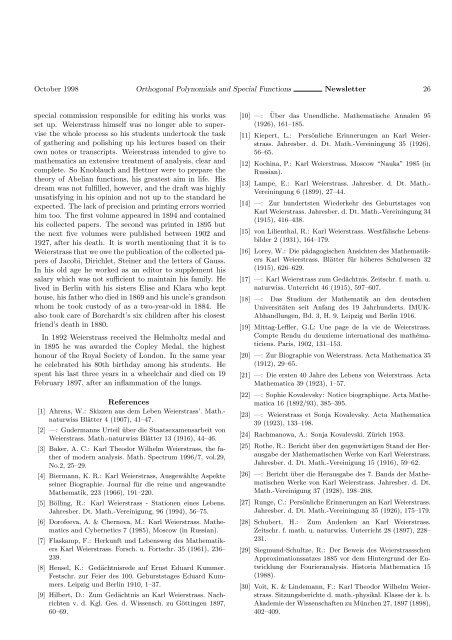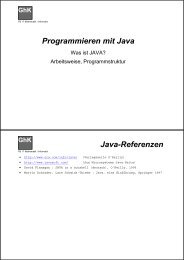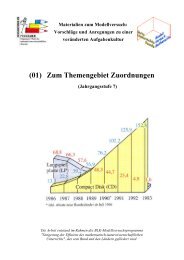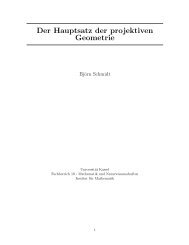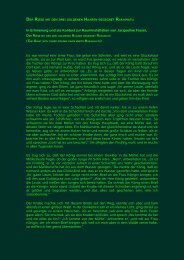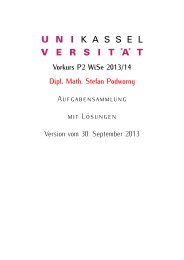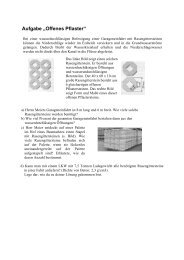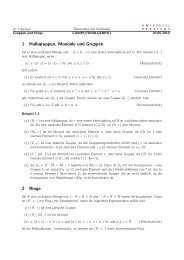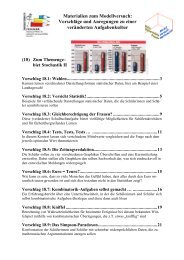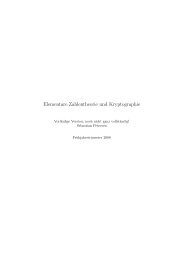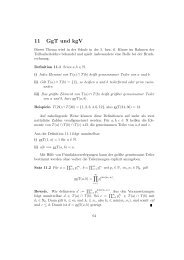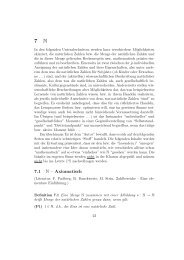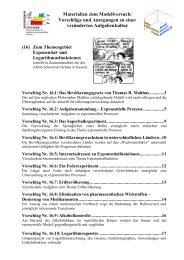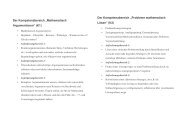Orthogonal Polynomials and Special Functions
Orthogonal Polynomials and Special Functions
Orthogonal Polynomials and Special Functions
You also want an ePaper? Increase the reach of your titles
YUMPU automatically turns print PDFs into web optimized ePapers that Google loves.
October 1998 <strong>Orthogonal</strong> <strong>Polynomials</strong> <strong>and</strong> <strong>Special</strong> <strong>Functions</strong> Newsletter 26<br />
special commission responsible for editing his works was<br />
set up. Weierstrass himself was no longer able to supervise<br />
the whole process so his students undertook the task<br />
of gathering <strong>and</strong> polishing up his lectures based on their<br />
own notes or transcripts. Weierstrass intended to give to<br />
mathematics an extensive treatment of analysis, clear <strong>and</strong><br />
complete. So Knoblauch <strong>and</strong> Hettner were to prepare the<br />
theory of Abelian functions, his greatest aim in life. His<br />
dream was not fulfilled, however, <strong>and</strong> the draft was highly<br />
unsatisfying in his opinion <strong>and</strong> not up to the st<strong>and</strong>ard he<br />
expected. The lack of precision <strong>and</strong> printing errors worried<br />
him too. The first volume appeared in 1894 <strong>and</strong> contained<br />
his collected papers. The second was printed in 1895 but<br />
the next five volumes were published between 1902 <strong>and</strong><br />
1927, after his death. It is worth mentioning that it is to<br />
Weierstrass that we owe the publication of the collected papers<br />
of Jacobi, Dirichlet, Steiner <strong>and</strong> the letters of Gauss.<br />
In his old age he worked as an editor to supplement his<br />
salary which was not sufficient to maintain his family. He<br />
lived in Berlin with his sisters Elise <strong>and</strong> Klara who kept<br />
house, his father who died in 1869 <strong>and</strong> his uncle’s gr<strong>and</strong>son<br />
whom he took custody of as a two-year-old in 1884. He<br />
also took care of Borchardt’s six children after his closest<br />
friend’s death in 1880.<br />
In 1892 Weierstrass received the Helmholtz medal <strong>and</strong><br />
in 1895 he was awarded the Copley Medal, the highest<br />
honour of the Royal Society of London. In the same year<br />
he celebrated his 80th birthday among his students. He<br />
spent his last three years in a wheelchair <strong>and</strong> died on 19<br />
February 1897, after an inflammation of the lungs.<br />
References<br />
[1] Ahrens, W.: Skizzen aus dem Leben Weierstrass’. Math.naturwiss<br />
Blätter 4 (1907), 41–47.<br />
[2] —: Gudermanns Urteil über die Staatsexamensarbeit von<br />
Weierstrass. Math.-naturwiss Blätter 13 (1916), 44–46.<br />
[3] Baker, A. C.: Karl Theodor Wilhelm Weierstrass, the father<br />
of modern analysis. Math. Spectrum 1996/7, vol.29,<br />
No.2, 25–29.<br />
[4] Biermann, K. R.: Karl Weierstrass, Ausgewählte Aspekte<br />
seiner Biographie. Journal für die reine und angew<strong>and</strong>te<br />
Mathematik, 223 (1966), 191–220.<br />
[5] Bölling, R.: Karl Weierstrass - Stationen eines Lebens.<br />
Jahresber. Dt. Math.-Vereinigung, 96 (1994), 56–75.<br />
[6] Dorofeeva, A. & Chernova, M.: Karl Weierstrass. Mathematics<br />
<strong>and</strong> Cybernetics 7 (1985), Moscow (in Russian).<br />
[7] Flaskamp, F.: Herkunft und Lebensweg des Mathematikers<br />
Karl Weierstrass. Forsch. u. Fortschr. 35 (1961), 236–<br />
239.<br />
[8] Hensel, K.: Gedächtnisrede auf Ernst Eduard Kummer.<br />
Festschr. zur Feier des 100. Geburststages Eduard Kummers.<br />
Leipzig und Berlin 1910, 1–37.<br />
[9] Hilbert, D.: Zum Gedächtnis an Karl Weierstrass. Nachrichten<br />
v. d. Kgl. Ges. d. Wissensch. zu Göttingen 1897,<br />
60–69.<br />
[10] —: Über das Unendliche. Mathematische Annalen 95<br />
(1926), 161–185.<br />
[11] Kiepert, L.: Persönliche Erinnerungen an Karl Weierstrass.<br />
Jahresber. d. Dt. Math.-Vereiningung 35 (1926),<br />
56–65.<br />
[12] Kochina, P.: Karl Weierstrass. Moscow “Nauka” 1985 (in<br />
Russian).<br />
[13] Lampe, E.: Karl Weierstrass. Jahresber. d. Dt. Math.-<br />
Vereiningung 6 (1899), 27–44.<br />
[14] —: Zur hundertsten Wiederkehr des Geburtstages von<br />
Karl Weierstrass. Jahresber. d. Dt. Math.-Vereiningung 34<br />
(1915), 416–438.<br />
[15] von Lilienthal, R.: Karl Weierstrass. Westfälische Lebensbilder<br />
2 (1931), 164–179.<br />
[16] Lorey, W.: Die pädagogischen Ansichten des Mathematikers<br />
Karl Weierstrass. Blätter für höheres Schulwesen 32<br />
(1915), 626–629.<br />
[17] —: Karl Weierstrass zum Gedächtnis. Zeitschr. f. math. u.<br />
naturwiss. Unterricht 46 (1915), 597–607.<br />
[18] —: Das Studium der Mathematik an den deutschen<br />
Universitäten seit Anfang des 19 Jahrhunderts. IMUK-<br />
Abh<strong>and</strong>lungen, Bd. 3, H. 9. Leipzig und Berlin 1916.<br />
[19] Mittag-Leffler, G.L: Une page de la vie de Weierstrass.<br />
Compte Rendu du deuxieme international des mathématiciens.<br />
Paris, 1902, 131–153.<br />
[20] —: Zur Biographie von Weierstrass. Acta Mathematica 35<br />
(1912), 29–65.<br />
[21] —: Die ersten 40 Jahre des Lebens von Weierstrass. Acta<br />
Mathematica 39 (1923), 1–57.<br />
[22] —: Sophie Kovalevsky: Notice biographique. Acta Mathematica<br />
16 (1892/93), 385–395.<br />
[23] —: Weierstrass et Sonja Kovalevsky. Acta Mathematica<br />
39 (1923), 133–198.<br />
[24] Rachmanowa, A.: Sonja Kovalevski. Zürich 1953.<br />
[25] Rothe, R.: Bericht über den gegenwärtigen St<strong>and</strong> der Herausgabe<br />
der Mathematischen Werke von Karl Weierstrass.<br />
Jahresber. d. Dt. Math.-Vereinigung 15 (1916), 59–62.<br />
[26] —: Bericht über die Herausgabe des 7. B<strong>and</strong>s der Mathematischen<br />
Werke von Karl Weierstrass. Jahresber. d. Dt.<br />
Math.-Vereinigung 37 (1928), 198–208.<br />
[27] Runge, C.: Persönliche Erinnerungen an Karl Weierstrass.<br />
Jahresber. d. Dt. Math.-Vereiningung 35 (1926), 175–179.<br />
[28] Schubert, H.: Zum Andenken an Karl Weierstrass.<br />
Zeitschr. f. math. u. naturwiss. Unterricht 28 (1897), 228–<br />
231.<br />
[29] Siegmund-Schultze, R.: Der Beweis des Weierstrassschen<br />
Approximationssatzes 1885 vor dem Hintergrund der Entwicklung<br />
der Fourieranalysis. Historia Mathematica 15<br />
(1988).<br />
[30] Voit, K. & Lindemann, F.: Karl Theodor Wilhelm Weierstrass.<br />
Sitzungsberichte d. math.-physikal. Klasse der k. b.<br />
Akademie der Wissenschaften zu München 27, 1897 (1898),<br />
402–409.


